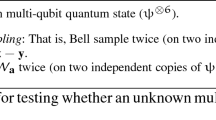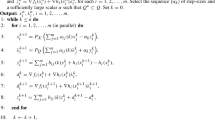Abstract
This paper considers the Byzantine agreement problem in a completely connected network of anonymous processors. In this network model the processors have no identifiers and can only detect the link through which a message is delivered. We present a polynomial-time agreement algorithm that requires 3⌊(n−t)t/(n−2t)⌋+4 rounds, where n>3t is the number of processors and t is the maximal number of faulty processors that the algorithm can tolerate. We also present an early-stopping variant of the algorithm.
Similar content being viewed by others
References
Angluin, D.: Local and global properties in networks of processors. In: Proc. 12th ACM Symposium on Theory of Computing (STOC), pp. 82–93 (1980)
Attiya, H., Welch, J.: Distributed Computing: Fundamentals, Simulations and Advanced Topics, 2nd edn. Wiley-Interscience, New York (2004)
Attiya, H., Gorbach, A., Moran, S.: Computing in totally anonymous asynchronous shared memory systems. Inf. Comput. 173(2), 162–183 (2002)
Barak, B., Canetti, R., Lindell, Y., Pass, R., Rabin, T.: Secure computation without authentication. In: Proc. 25th Annual International Cryptology Conference (CRYPTO), pp. 361–377 (2005)
Ben-Or, M., Goldwasser, S., Wigderson, A.: Completeness theorems for non-cryptographic fault-tolerant distributed computation. In: Proc. 20th ACM Symposium on Theory of Computing (STOC), pp. 1–10 (1988)
Boldi, P., Vigna, S.: Computing anonymously with arbitrary knowledge. In: Proc. 18th ACM Symposium on Principles of Distributed Computing (PODC), pp. 181–188 (1999)
Boldi, P., Vigna, S.: An Effective characterization of computability in anonymous networks. In: Distributed Computing, 15th International Conference (DISC), pp. 33–47 (2001)
Chaum, D.: Blind signatures for untraceable payments. In: Proc. CRYPTO, pp. 199–203 (1982)
Chaum, D.: Elections with unconditionally-secret ballots and disruption equivalent to breaking RSA. In: Proc. EUROCRYPT, pp. 177–182 (1988)
Chaum, D., Crepeau, C., Damgard, I.: Multiparty unconditionally secure protocols. In: Proc. 20th ACM Symposium on Theory of Computing (STOC), pp. 11–19 (1988)
Cohen, J.D., Fischer, M.J.: A robust and verifiable cryptographically secure election scheme. In: Proc. 26th Annual IEEE Symposium on Foundations of Computer Science (FOCS), pp. 372–382 (1985)
Dolev, D., Strong, H.R.: Authenticated algorithms for Byzantine agreement. SIAM J. Comput. 12(4), 656–666 (1983)
Dolev, D., Fischer, M.J., Fowler, R., Lynch, N.A., Strong, H.R.: An efficient algorithm for Byzantine agreement without authentication. Inf. Control 52(3), 257–274 (1982)
Dolev, D., Reischuk, R., Strong, H.R.: Early stopping in Byzantine agreement. J. ACM 37(4), 720–741 (1990)
Fischer, M.J., Lynch, N.A.: A lower bound for the time to assure interactive consistency. Inf. Process. Lett. 14(4), 183–186 (1982)
Fischer, M.J., Lynch, N.A., Merritt, M.: Easy impossibility proofs for distributed consensus problems. Distrib. Comput. 1(1), 26–39 (1986)
Garay, J.A., Moses, Y.: Fully polynomial Byzantine agreement for n>3t processors in t+1 rounds. SIAM J. Comput. 27(1), 247–290 (1998)
Goldreich, O., Micali, S., Wigderson, A.: How to play any mental game or a completeness theorem for protocols with honest majority. In: Proc. 19th ACM Symposium on Theory of Computing (STOC), pp. 218–229 (1987)
Lamport, L., Schostak, R., Pease, M.: The Byzantine generals problem. ACM Trans. Program. Lang. Syst. 4(3), 382–401 (1982)
Lynch, N.A.: Distributed Algorithms. Morgan Kaufmann (1996)
Okun, M.: Agreement among unacquainted Byzantine generals. In: Distributed Computing, 19th International Conference (DISC), pp. 499–500 (2005)
Okun, M., Barak, A.: On anonymous Byzantine agreement. Leibniz Center TR 2004-2, School of Computer Science, The Hebrew University (2004)
Pease, M., Shostak, R., Lamport, L.: Reaching agreement in the presence of faults. J. ACM 27(2), 228–234 (1980)
Srikanth, T.K., Toueg, S.: Simulating authenticated broadcasts to derive simple fault-tolerant algorithms. Distrib. Comput. 2(2), 80–94 (1987)
Srikanth, T.K., Toueg, S.: Optimal clock synchronization. J. ACM 34(3), 626–645 (1987)
Toueg, S., Perry, K.J., Srikanth, T.K.: Fast distributed agreement. SIAM J. Comput. 16(3), 445–457 (1987)
Turpin, R., Coan, B.A.: Extending binary Byzantine agreement to multivalued Byzantine agreement. Inf. Process. Lett. 18(2), 73–76 (1984)
Yamashita, M., Kameda, T.: Computing on anonymous networks: Part I—characterizing the solvable cases. IEEE Trans. Parallel Distrib. Syst. 7(1), 69–89 (1996)
Author information
Authors and Affiliations
Corresponding author
Rights and permissions
About this article
Cite this article
Okun, M., Barak, A. Efficient Algorithms for Anonymous Byzantine Agreement. Theory Comput Syst 42, 222–238 (2008). https://doi.org/10.1007/s00224-007-9006-9
Published:
Issue Date:
DOI: https://doi.org/10.1007/s00224-007-9006-9




